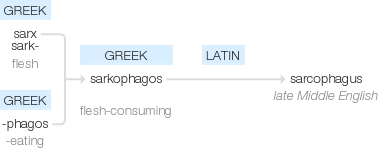Sarcophagus
late Middle English: via Latin from Greek sarkophagos ‘flesh-consuming’, from sarx, sark- ‘flesh’ + -phagos ‘-eating’.
wiktionary
From Latin sarcophagus, from Ancient Greek σαρκοφάγος(sarkophágos, “coffin of limestone”, noun), so named from a supposed property of consuming the flesh of corpses laid in it, from σαρκοφάγος(sarkophágos, “flesh-eating, carnivorous”), from genitive σαρκός(sarkós) of σάρξ(sárx, “ flesh, meat”) + -φάγος(-phágos) (from ἔφαγον(éphagon), past of φάγω(phágō, “ eat”)).
etymonline
sarcophagus (n.)
c. 1600, "type of stone used by the ancients for making coffins," from Latin sarcophagus, from Greek sarkophagos (lithos) "limestone used for coffins;" the adjective means "flesh-eating," a reference to the supposed action of this type of limestone (quarried near Assos in Troas, hence the Latin lapis Assius) in quickly decomposing bodies.
It is a compound of sarx (genitive sarkos) "flesh" (see sarcasm) + phagein "to eat" (from PIE root *bhag- "to share out, apportion; to get a share"). Related: Sarcophagal.
The "stone" sense was the earliest in English; the meaning "stone coffin," often one with inscriptions or decorative carvings is by 1705. The Latin word, shortened in Vulgar Latin to *sarcus, is the source of French cercueil, German Sarg "coffin," Dutch zerk "tombstone."
